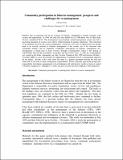Community participation in fisheries management: prospects and challenges for co-management
Author
Date
2004Type
Articleviews
downloads
Metadata
Show full item recordxmlui.dri2xhtml.METS-1.0.item-citation
Community participation in fisheries management: prospects and challenges for co-management J. Ikwaput Nyeko Fisheries Resources Department, P.O. Box 4, Entebbe, Uganda
Abstract/
Fisheries play an important role in the economy of Uganda, contributing to foreign exchange, food security and employment. In 1998, the total fish catch landed was 217,100 metric tons of which Lake Victoria contributed 48.6%. The development of government centred management systems has led to increasing alienation of resource users and to wilful disregard of specific regulations. The realisation of the problems faced by the current management systems has led to the recognition that user groups need to be actively involved in fisheries management if the systems are to be consistent with sustainable fisheries and be legitimate. Community participation in fisheries management (Comanagement) is being tried in Lake Victoria, through co-management, which is the sharing of responsibility between the government, researchers and the resource users. A study on co-management was carried in the fisher communities on Lake Victoria, Uganda in July 1999 and between October – November 2000, to assess the potential for implementing a community-based co-management approach on the fishery. Results of this study show that there is a general agreement between the staff and fisher-folk on the need to share management responsibilities. Fishers generally agreed that giving more responsibility for fisheries management to local fishermen will yield positive results in terms of control of fisheries malpractices, willingness to collect and give accurate data and compliance with regulations.

